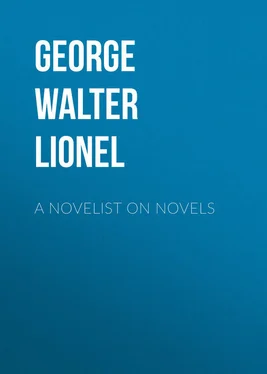Walter George - A Novelist on Novels
Здесь есть возможность читать онлайн «Walter George - A Novelist on Novels» — ознакомительный отрывок электронной книги совершенно бесплатно, а после прочтения отрывка купить полную версию. В некоторых случаях можно слушать аудио, скачать через торрент в формате fb2 и присутствует краткое содержание. Жанр: foreign_antique, foreign_prose, foreign_sf, на английском языке. Описание произведения, (предисловие) а так же отзывы посетителей доступны на портале библиотеки ЛибКат.
- Название:A Novelist on Novels
- Автор:
- Жанр:
- Год:неизвестен
- ISBN:нет данных
- Рейтинг книги:3 / 5. Голосов: 1
-
Избранное:Добавить в избранное
- Отзывы:
-
Ваша оценка:
- 60
- 1
- 2
- 3
- 4
- 5
A Novelist on Novels: краткое содержание, описание и аннотация
Предлагаем к чтению аннотацию, описание, краткое содержание или предисловие (зависит от того, что написал сам автор книги «A Novelist on Novels»). Если вы не нашли необходимую информацию о книге — напишите в комментариях, мы постараемся отыскать её.
A Novelist on Novels — читать онлайн ознакомительный отрывок
Ниже представлен текст книги, разбитый по страницам. Система сохранения места последней прочитанной страницы, позволяет с удобством читать онлайн бесплатно книгу «A Novelist on Novels», без необходимости каждый раз заново искать на чём Вы остановились. Поставьте закладку, и сможете в любой момент перейти на страницу, на которой закончили чтение.
Интервал:
Закладка:
This picture may seem too black, but it is that of Great Britain, where contempt for literature has risen to a peculiar degree. Make an imaginative effort; see yourself in the drawing-room of some social leader, where a 'crush' of celebrities is taking place. A flunkey at the head of the stairs announces the guests. He announces: 'Lord Curzon! … Mr Joseph Conrad! … The Bishop of London!' Who caused a swirl in the 'gilded throng?' The cleric? The politician? Or the novelist? Be honest in your reply, and you will know who, at that hypothetical reception, created a stir. The stir, according to place or period, greeted the politician or the bishop, and only in purely literary circles would Mr Conrad have been preferred… For the worship of crowds goes to power rather than to distinction, to the recognised functionary of the State, to him whose power can give power, to all the evanescent things, and seldom to those stockish things, the milestones on the road to eternity. The attitude of the crowd is the attitude of the State, for the State is only the crowd, and often just the mob; it is the chamberlain of ochlocracy, the leader who follows. In all times, the State has shown its indifference, its contempt, for the arts, and particularly for literature. Now and then a prince, such as Louis of Bavaria, Philip of Spain, Lorenzo the Magnificent, has given to literature more than respect. He has given love, but that only because he was a man before a prince. The prince must prefer the lawyer, the politician, the general, and indeed, of late years what prince was found to patron George Meredith or Henry James?
The attitude of the State to the novelist defines itself most clearly when a royal commission is appointed. In England, royal commissions are ad hoc bodies appointed by the government from among men of political influence and special knowledge, to investigate a special question.
As a rule they are well composed. For instance, a royal commission on water supply would probably comprise two or three members of Parliament of some standing, the President of the Institute of Civil Engineers, a professor of sanitation, a canal expert, one or two trade unionists, one or two manufacturers, and a representative of the Home Office or the Board of Trade. Any man of position who has shown interest in public affairs may be asked to sit on a royal commission … provided he is not a novelist. Only one novelist has attained so giddy a height: Sir Rider Haggard; how it happened is not known: it must have been a mistake. We are not weighty enough, serious enough to be called on, even if our novels are so weighty and so serious that hardly anybody can read them. We are a gay tribe of Ariels, too light to discuss even our own trade. For royal commissions concern themselves with our trade, with copyright law, with the restrictions of the paper supply. You might think that, for instance, paper supply concerned us, for we use cruel quantities, yet no recognised author sat on the commission; a publisher was the nearest approach. Apparently there were two great consumers of paper, authors and grocers, but alone the grocers were consulted. What is the matter with us? Is our crime that we put down in indecent ink what we think and feel, while other people think and feel the same, but prudently keep it down? Possibly our crimes are our imagination and our tendency to carry this imagination into action. Bismarck said that a State conducted on the lines of the Sermon on the Mount would not last twenty-four hours; perhaps it is thought that a State in the conduct of which a novelist had a share would immediately resolve itself into a problem play. Something like that, though in fact it is unlikely that Ariel come to judgment would be much more fanciful in his decrees than the historic Solomon.
All this because we lack solidity … and yet the public calls us commercial, self-advertisers, money-grubbers. It is thought base that we should want three meals a day, though nobody suggests that we can hope to find manna in the street, or drink in our parks from the fountain Hippocrene. We are told that we make our contracts too keenly, that we are grasping, that we are not straight … and yet we are told that we are not business men. What are we to do? Shall we form a trade union and establish a piece rate? Shall we sell our novels by the yard? May we not be as commercial and respected as the doctor who heals with words and the lawyer who strangles with tape? Now and then the defences of society and state are breached, and a novelist enters Parliament. Mr Hilaire Belloc, Mr A. E. W. Mason, followed Disraeli into the House of Commons, but it is very extraordinary. No one knows how these gentlemen managed to convince the electors that with their eye 'in fine frenzy rolling' they would not scandalise their party by voting against it. (Those writing chaps, you know, they aren't safe !)
It must be said that in Parliament the novelists did not have a very good time; they were lucky in having been preferred to a landowner or a pawnbroker, but once in they had not the slightest chance of being preferred to those estimable members of society. It was not a question of straight votes; it never came to that, for Mr Belloc soon disagreed with both sides and became a party of one, while Mr A. E. W. Mason as a rushlight flickered his little flicker and went out. It is as well; they would never have been taken seriously. It is almost a tradition that they should not be taken seriously, and it is on record in most of the worldly memoirs of the nineteenth century that the two main objections to Disraeli were his waistcoats and his authorship of Contarini Fleming . Nero liked to see people burnt alive; Disraeli wrote novels. Weaknesses are found in all great men.
There seems in this to lie error as well as scandal; when a new organisation is created, say for the control of lamp oil, obviously a novelist should not be made its chairman, but why should a blotting paper merchant be preferred? Indeed, one might side with Mr Zangwill, who demands representation for authors in the Cabinet itself, on the plea that they would introduce the emotion which is necessary if the Cabinet is to manage impulsive mankind. As he finely says, we are professors of human nature; if only some University would give us a title and some initials to follow our name, say P.H.N., people might believe that we knew something of it. But the attitude of the State in these matters is steadfast enough. It recognises us as servants rather than as citizens; if in our later years we come upon hard times, we can be given, through the Civil List, pensions which rescue us from the indignities of the poorhouse, but no more. Mostly these pensions benefit our heirs, but the offering is so small that it shocks; it is like tipping an archbishop. Thus Mr W. B. Yeats enjoys a pension of £150, Mr Joseph Conrad, of £100. Why give us pensions at all if they must be alms? One cannot be dignified on £100 a year; one can be dignified on £5000 a year, because the world soon forgets that you ride a gift horse if that horse is a fine, fat beast. The evidence is to be found in the retiring pensions of our late Lord Chancellors, who receive £5000 a year, of our Judges, £1000 to £3750, in the allowances made to impoverished politicians, which attain £2000. Out of a total of £320,000 met by our civil list, literature, painting, science, research, divide every year £1200. Nor do the immediate rewards show greater equality. Lord Roberts was voted £100,000 for his services in South Africa; Mr Thomas Hardy has not yet been voted anything for The Dynasts .
The shame of literature is carried on even into following generations. The present Lord Nelson, who is not a poor man, for he owns 7000 acres of land, is still drawing a pension of £5000 a year, earned by his august ancestor, but the daughter of Leigh Hunt must be content with £50. We are unknown. We are nobody. Rouget de l'Isle, author of La Marseillaise , gave wings to the revolutionary chariot, but tiny, bilious, tyrannic Robespierre rode in it, and rides in it to-day through the pages of history, while men go to their death singing the words of Rouget de l'Isle and know him not.
Читать дальшеИнтервал:
Закладка:
Похожие книги на «A Novelist on Novels»
Представляем Вашему вниманию похожие книги на «A Novelist on Novels» списком для выбора. Мы отобрали схожую по названию и смыслу литературу в надежде предоставить читателям больше вариантов отыскать новые, интересные, ещё непрочитанные произведения.
Обсуждение, отзывы о книге «A Novelist on Novels» и просто собственные мнения читателей. Оставьте ваши комментарии, напишите, что Вы думаете о произведении, его смысле или главных героях. Укажите что конкретно понравилось, а что нет, и почему Вы так считаете.












